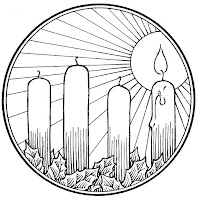CLICK HERE for the sermon audio.
No sermon video.
Jesus: The Lord Saves
Grace to you and peace from God our Father, and from our Lord and Savior Jesus Christ. Amen.
Our gospel for this Feast of the Church Year is a short verse: “And when eight days were completed for the circumcision of the Child, His name was called JESUS, the name given by the angel before He was conceived in the womb.” We begin the New Year with this reading because tomorrow is the eighth day after Christmas. So eight days after His birth, the infant Jesus was circumcised and formally received His name. The name “Jesus” is equal to “Joshua.” The Old Testament Joshua was the faithful man who led the people at their entrance into the Promised Land. Moses died before the event, but Joshua completed the work, according to the promise that God made to Moses. In Hebrew, Joshua means “the Lord saves us” or “the Lord is my Savior.” Translated into Greek, the name “Joshua” becomes “Jesus.”
As we read this evening in Genesis, circumcision was instituted to be the entrance of the male child into the community of Israel. Today male children receive circumcision at the hospital for hygienic reasons. However, at that time, circumcision meant that the child would be a child of Abraham and an heir of the promises of God to Abraham.
With the birth of Jesus Christ, His life, death and resurrection, all the promises were fulfilled that God made to Abraham and the patriarchs of Israel. In the blood of Christ, God made a new covenant with all nations. Since this is the case, all who believe in Jesus Christ are heirs of Abraham. The church, the assembly of believers in Jesus, is now the people of God, the new Israel. St. Peter called the church a holy nation and royal priesthood, the same words applied to Israel in the Old Testament. Baptism has replaced the Old Testament covenant. The watered blood which flowed from our Lord’s side has replaced the blood of circumcision. Our children do not need the mark of their own blood on their bodies to be known as the seed of Abraham; in the water and the Word, we have the seal of the promise of eternal life. In our text St. Paul says it this way: “As many as have been baptized into Christ are clothed with Christ.”
Our sins are covered by the righteousness of Christ. In baptism we receive the righteousness of Christ along with His name. He was known not only as Jesus, but also Christ--that is, the Messiah. The disciples of Jesus were called Christians for the first time in the city of Antioch. In the name of Christ, we are saints of God: not by our own strength, but by faith in Christ. St. Paul says, “The law was our tutor to bring us to Christ, that we might be justified by faith. But after faith has come, we are no longer under a tutor.” For thse who believe in Christ, the law is like a measuring-stick. How do we live as children of God? The law teaches us to love the Lord your God with your whole being and to love your neighbor as yourself. How do we do this? We cannot do it on our own, by our own righteousness; it is only by the work of the Holy Spirit in Holy Baptism that we receive the perfect love which our Lord Jesus lived for us.
Therefore, we do not obey the law for fear of punishment, because in Christ we are free from condemnation. In Christ we know the perfect love of God, because God sent His only Son to suffer our punishment and to die on the cross in our place. Our motive is to show others the love that God has shown us in Christ--again, not out of fear of punishment, but in thanksgiving for the sacrificial love of Christ.
All receive the gift of faith and the blessing of God in baptism equally. St. Paul says, “There is neither Jew nor Greek, there is neither slave nor free, there is neither male nor female; for you are all one in Christ Jesus.” In a sense, the concept of human rights is based on the idea that all human beings are creatures of God. Every human being has intrinsic value in the eyes of God, no matter his or her state in this world. Therefore, everyone has basic rights and a good government must recognize these rights. Even so, according to the order of creation, there are still distinctions in the status of human beings. Some are males, some are females. They all have their own ethnicity. There are rich and poor too. But this verse does not speak of the earthly state, but the spiritual state. We are all sinners and deserve the condemnation of God. But all receive by grace the promise of eternal life. We are equal in redemption.
We all have blessings in this life. We all have trials and difficulties. The new year will bring new blessings and new tribulations, and the gifts and struggles of this passing year may linger in our lives. Nevertheless, all these things will pass. Even so, Lord Jesus, come quickly! But the Word of God will endure forever. In this we have the peace this world cannot give: true peace in Christ, which will never fade away. In the name of the Father and of the Son (†) and of the Holy Spirit. Amen.
The peace of God which passes all understanding will keep your hearts and minds in Christ Jesus always. Amen.
.tif)

.tif)

.tif)

.tif)

.tif)
%20%20(Mt%206.24-34).tif)






